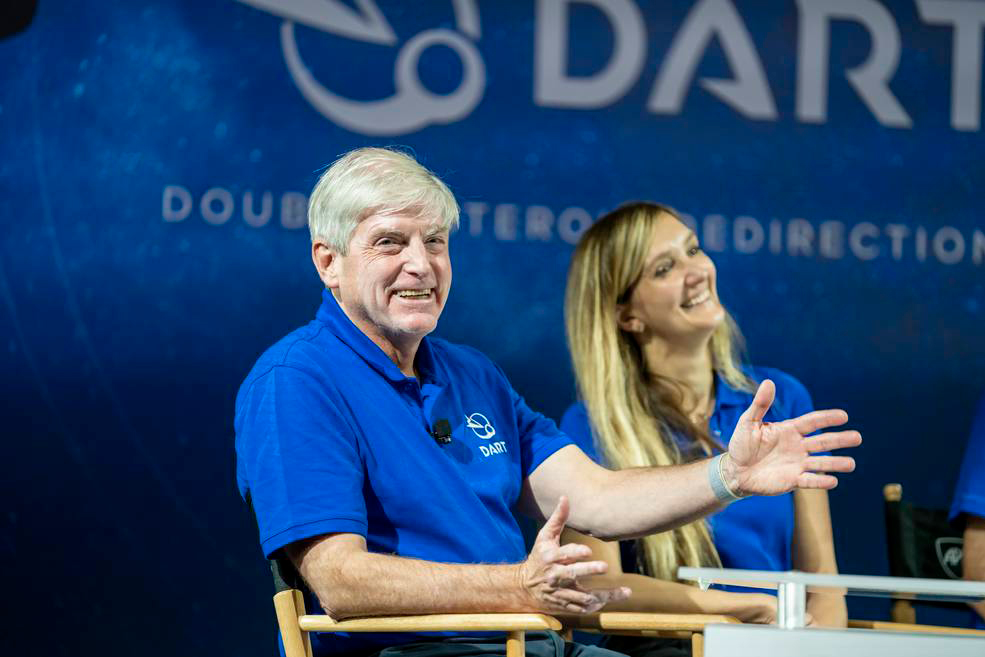A GW alum led the first NASA mission to prove that humans could redirect an asteroid’s path away from Earth.
Edward Reynolds, who received his master’s degree in project management from GW in 2013, was the project manager for the Double Asteroid Redirection Test, the first tool that allows humans to redirect an asteroid in danger of hitting Earth. Reynolds’ leadership of the DART project landed him a spot on Time magazine’s annual list of 100 most influential people in 2023, alongside prominent figures like Beyoncé, Disney CEO Bob Iger and President Joe Biden.
Time has published the annual list for nearly two decades, which has grown to foster a community of leaders who gather throughout the year. The central theme of Time’s 2023 list was “interconnected challenges,” and climate change is at the center of those challenges, with 16 people on the list — including Colombian President Gustavo Petro and King Charles of the United Kingdom — working to defend the environment through policy and advocacy.
Reynolds said his recognition in Time was a sort of “proxy” for the larger field of terrestrial protection as the issue comes further into public awareness through media and his laboratory analyzes the data from the DART mission.
“You go about life like everybody else, and then here comes this list, and congratulations you’re one of Time’s 100. And it’s in recognition of DART,” Reynolds said.
In 1985, Reynolds graduated from Virginia Tech with a bachelor’s degree in electrical engineering and began working at the Johns Hopkins Applied Physics Laboratory, according to Reynolds’ LinkedIn. Working at the APL ever since, he became the space sector project manager for the DART project when the lab partnered with NASA in 2019.
Reynolds held many positions over his 38-year tenure at the APL, including a 10-year stint in system engineering where he led the team designing spacecraft. The APL chose Reynolds for the DART project because of his experience with deep space missions.
As project manager, Reynolds managed funds and personnel for the DART project, which began in 2019 and lasted until 2023. The mission’s goal was to contact an asteroid with a spacecraft and redirect its course away from Earth.
Though the asteroid DART was tested on was not on an Earth-bound path, the mission was successful in proving an asteroid can be redirected if necessary by slowing its momentum and changing its orbit, which the test does by precisely crashing a spacecraft into a target asteroid. The project received $330 million in funding and had more than 1000 team members.
Reynolds said protecting Earth from asteroids is a “real issue” as recent studies have brought into question the odds of an asteroid strike, claiming the likelihood is higher than previously understood. Reynolds said movies about asteroids hitting Earth like the 2021 film “Don’t Look Up” caused the issue to garner public attention.
“The public is interested, the public is concerned,” Reynolds said. “It is a real issue that the Earth could get hit by an asteroid, and this was the first mission that tried to do something about it.”
Reynolds said it is “mind-boggling” to be included on this list alongside prestigious figures, pointing to how fortunate the APL team was that the DART mission succeeded. He said people influence the public in different ways, and that he likes that influence by those working on scientific issues, like global warming, and those influencing pop culture, like Youtuber Mr. Beast, are recognized on the list.
Reynolds said he wanted his master’s degree from GW to give him a formal education in project management, a job he had been doing at the APL for years, and that the GW program was a “perfect fit” and expanded his understanding of project management. Reynolds said having a degree like the one he received at GW is integral when managing projects with a large budget because it expands his qualifications.
“It gives you real legitimacy, that the government is entrusting you to properly manage these projects and this money,” said Reynolds.





